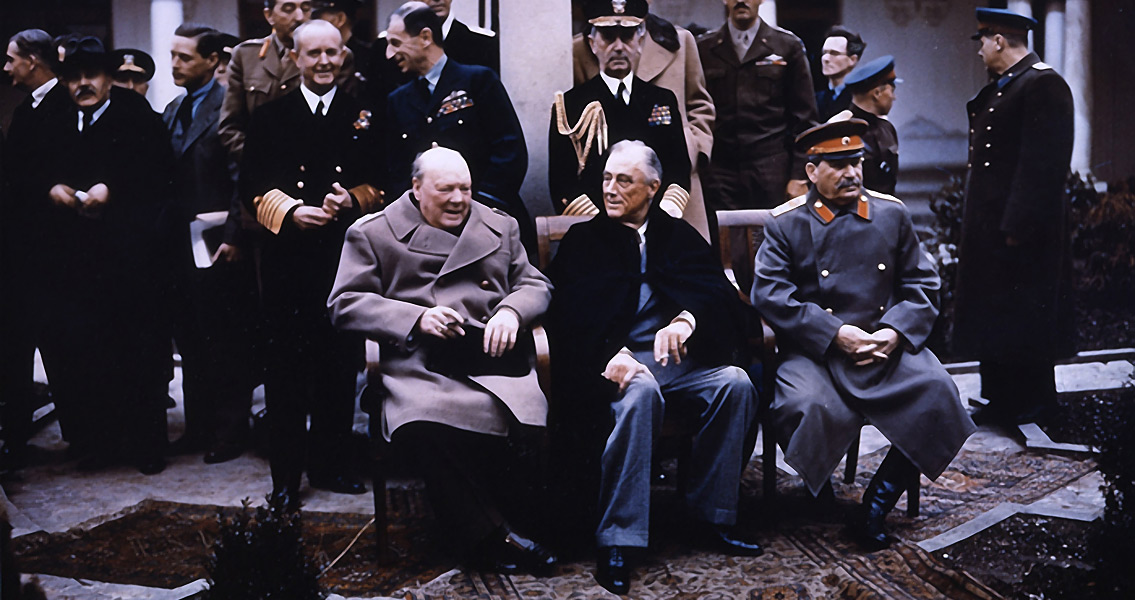<![CDATA[The 4th February marks the seventieth anniversary of the start of the Yalta Conference, a key meeting between the leaders of the allied powers towards the end of the Second World War. Attending the meeting were US President Franklin D. Roosevelt, British Prime Minister Winston Churchill and Premier of the Soviet Union Joseph Stalin. Over the course of the seven day meeting the three leaders made plans for the final defeat and fate of Germany, making key decisions which would shape world history for rest of the twentieth century and beyond. Before the meeting it had already been decided that Germany would be divided up into zones to be occupied and administered by the Soviet Union, the United States, Britain and France. It had also been agreed that once the Allied forces entered Germany, the German war machine and military would be disassembled. The Allied leaders agreed that their only obligation to Germany was to provide the bare minimum to ensure the country's population could survive following the defeat. These provisions seemed to reflect that important lessons had been learnt from the end of the First World War - that defeating, punishing and then abandoning Germany would likely lead to long term resentment and reprisals. The conference took place in a Russian resort town in Crimea, something which seemed appropriate as the decisions made there would have a significant impact on Eastern Europe. Before the war Stalin's designs on Eastern Europe had been made clear in the covert Molotov-Ribbentrop pact which agreed to split the region between Nazi Germany and the USSR. At the conference the Polish-Russian and Polish-German borders for the post war world were agreed. Although one declaration of the meeting was that all countries freed from Nazi occupation would be allowed free-elections, some agreements on Eastern Europe seemed to contradict this. Churchill and Roosevelt agreed to Stalin's demand that all nations bordering the Soviet Union should be 'friendly' to the USSR. With hindsight this laid the foundations for Soviet domination over Eastern Europe for the next four decades. Such a concession to the Soviet Union seems outrageous with hindsight, and Roosevelt would be accused by American commentators of having "sold out Eastern Europe". The decision was made with the war in the Pacific in mind. By February 1945 Germany's defeat had become inevitable, but Japan still seemed capable of holding on for a brutal war of attrition. Churchill and Roosevelt, at this point unaware of the game changing potential of the Atomic Bomb, were desperate for Soviet Troops to be deployed in Asia. Stalin agreed to deploy Soviet troops against Japan. In exchange he won the concessions on Eastern Europe, as well as the return of the territories Russia had lost in the Russo-Japanese war. In the short term the three Allied leaders had achieved their aims - a frame work for Europe after the war, and a commitment to continuing the war with Japan. In many ways Yalta set the basis for the Cold War. The Soviet Union failed to honour its commitments on Eastern Europe, and free elections were never held in Bulgaria, Czechoslovakia, Poland or Romania. Yalta seemed to treat Europe as two distinct entities - East and West. This system for categorising the continent would ultimately play out in reality within a few years. The closing of the Iron Curtain in 1946 split Europe in two until the fall of the Soviet Union - and the categorisation of a separate East and West Europe can still be felt today. Image courtesy of Wikimedia commons user: The National Archives UK]]>
Seventy Years Since the Yalta Conference
